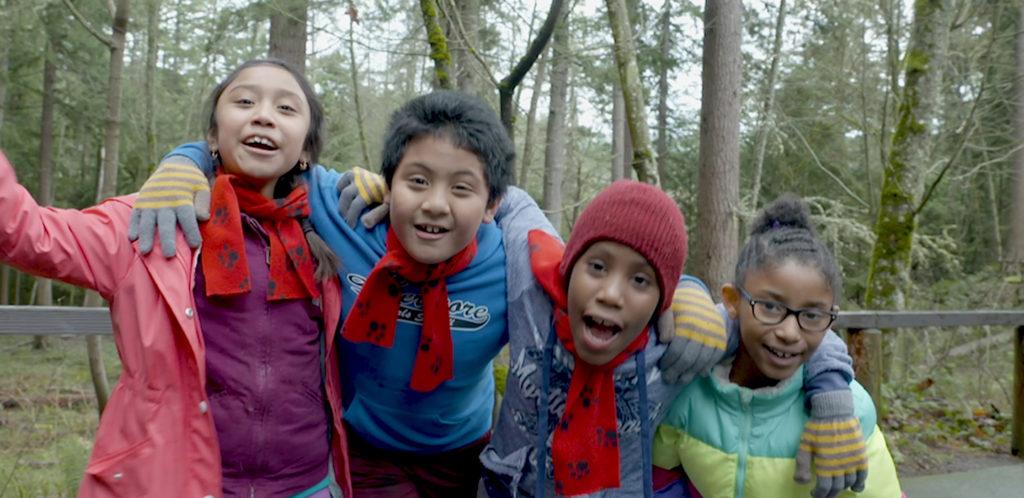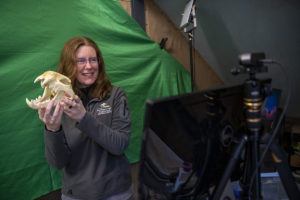
In front of a forest screen background, Jessica Moore tells a story of a walk in the woods. But it’s not just a walk. One by one, the Northwest Trek education curator pulls up “clues” she found on her walk: a feather, some quills, a photo of a pawprint etched with claws.
“Okay,” she says briskly, smiling into the camera. “Who’s ready to be a Northwest wildlife investigator?”
On her own laptop screen, young faces smile back and raise eager hands.
It’s time for Online Wildlife Academy, the park’s new virtual nature science program that’s offering a lifeline to beleaguered science teachers, busy parents and cabin-fevered kids alike. (Learn more and sign up here.)
Clapping for Joy
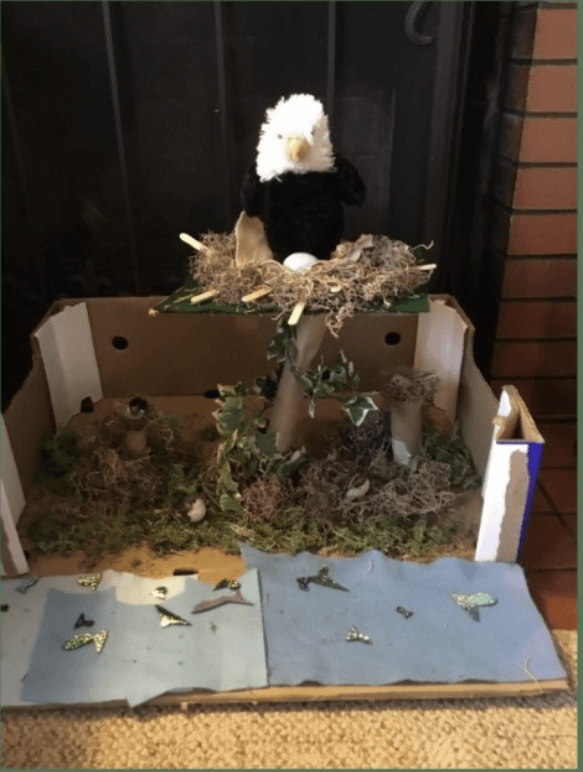
“This has been a great way to enrich our current online science instruction,” says Heather McMullen, director of instructional leadership in math and science PK-12 at the Puyallup School District. “With limited time and hands-on experience (during the pandemic school closures), Online Wildlife Academy has absolutely helped us teach science online.”
“My students loved it – they talked about it for weeks,” says Emily Alexander, a kindergarten teacher at Seattle’s Louisa Boren STEM K-8 Academy. “Every time Jessica named an animal they were studying, they lit up and started clapping!”
“Very informative, easy to follow and, most of all, fun!” sums up homeschooler Elijah, 13.
Ten months into school closures and online classes, to have kids clapping with joy during a science lesson is pretty rewarding – and a sign that you’re doing something right.
“Online Wildlife Academy has been really successful, I think, because it’s a great way to engage kids with science online,” says Moore. “It’s live, informative and led by a professional educator – that’s what makes us special.”
Five years of virtual wildlife
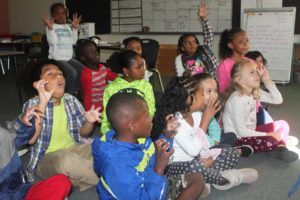
But although Northwest Trek formally launched Online Wildlife Academy last August, partnering with Eatonville and Puyallup school districts on the curriculum, the wildlife park isn’t a newbie when it comes to virtual science. It’s naturalists have been offering virtual programs for years, especially to schools too far away to visit in person or those unable to afford a physical field trip.
A mixture of live educator presentations, animal photos and videos, keeper chats, science facts, activities and Q&A, Online Wildlife Academy hits exactly the right note between informative and fun. Nine different lesson programs hit multiple Next Generation Science Standards across grades K-8.
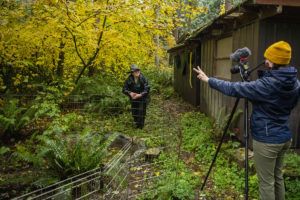
In “Northwest Wildlife Investigators,” kids learn about animal adaptations and survival strategies, as well as scientific observation, by examining clues and solving a mystery. “So You Want to Work in a Zoo?” looks at the skills you need for a wide variety of zoo jobs from animal care to graphic design. Various animal species are covered by “Northwest Raptors,” “Peek In the Pond,” “The Wonders of Wolverines” and “Are You Bear Aware?” In all programs, Moore balances talking with animal videos and photos, hands-on activities and student questions.
“The secret to keeping students engaged is constant variety,” Moore says.
All programs encourage students to observe, think and learn while doing what every kid enjoys doing – watching animals. And that helps teachers enormously.
Working with educators
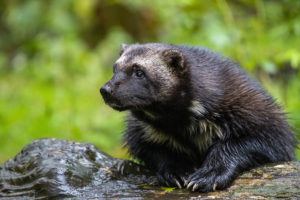
“When we do our Pacific Northwest habitat project, we usually take the students to the library and help them do research,” Alexander explains. “However, with remote learning we are limited to helping each student complete their own research. Online Wildlife Academy helped our students learn more about their animals than we could ever imagine. It was incredibly helpful and so engaging!”
To help Alexander’s class – each of whom had been assigned an animal to research and build a habitat for – Moore dove deep into each animal, talking about its needs and answering student questions.
“Teaching science online is particularly challenging, as it is usually so hands-on,” says Alexander. “We’ve had to adapt, and Online Wildlife Academy has helped a lot.”
The Online Wildlife Academy programs also give teachers a starting point to build supplemental science units, such as for grades K-6 in the Puyallup School District. Over the summer, Moore worked closely with Heather McMullen, director of instructional leadership in math and science, to plan topics, align science and report card standards, and fit content to class work. She also adapted the programs after initial feedback from teachers and students, including more engagement activities like drawing or writing. McMullen then went on to develop related resources, such as videos or songs.
“Online Wildlife Academy helps us a lot by providing a monthly event that teachers and students can look forward to, and which highlights life science standards,” explains McMullen.
“The feedback from both the students, and the families has been incredible,” adds Alexander.
Spicing up home learning
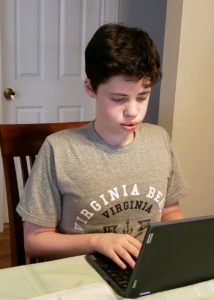
The programs are highly adaptable for both schools and homeschoolers, and parents have also been signing their students up for individual lessons to spice up the home learning required during the Covid-19-related school closures.
“Elijah absolutely loves all of the classes, and loves Ms. Jessica,” says Jenessa Stewart, a homeschool parent whose seventh-grade son has done seven of the programs (one per month since September). “Jessica does a great job of getting the kids interested and excited to learn new things. Elijah loves science, but was getting bored with our typical homeschool schedule. Adding in Online Wildlife Academy classes has been a wonderful way to break the monotony and learn new things.”
The programs have given Elijah and Jenessa other topics to study, Stewart says, and got them thinking hard about being better stewards of the Earth. They’ve even inspired Elijah to set his career sights on working in a zoo.
Parent Diana Peckham also loves the program for her son Evan, 13, who has autism. Learning at home as part of Renton School District, they’ve done seven classes since November.
“Evan has found all of these programs to be accessible, and as a parent, I have appreciated the instructors’ ability to manage a group of children who approach at different levels of understanding, accept all comments and questions with enthusiasm, and weave what was said back into the lesson at hand,” says Peckham. “The online courses through Northwest Trek have added a new topic and a bright spot in an otherwise regular online school day.”
Back to the future?
But even when school resumes in-person, Moore still sees future possibilities for Online Wildlife Academy.
“I would love for it to continue,” she says. “I see it as a fun after-school activity, a benefit for homeschoolers and school groups. Because even when school goes back in person, field trips aren’t going to happen for a while. This can’t fully replace a field trip, but it’s a science activity that can be a fun enrichment, a reward for students to look forward to.”
Learn more and sign up here for Online Wildlife Academy.
